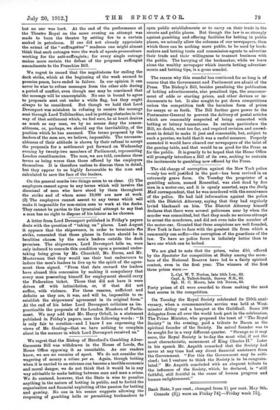We regret to record that the negotiations for ending the
dock strike, which at the beginning of the week seemed to promise peace, have ended in failure. In our opinion it can never be wise to refuse messages from the other side during a period of conflict, even though one may be convinced that the message will be unacceptable. No one is bound to agree to proposals sent out under a white flag, but they ought always to be considered. But though we hold that Lord Devonport was mistaken in refusing to receive the message sent through Lord Tullibardine, and in putting obstacles in the way of that settlement which, we feel sure, he at heart desires as much as any man, we by no means deny the reason- ableness, or, perhaps, we should say the inevitability, of the position which he has assumed. The terms proposed by the leaders of the men are, we believe, impossible. The unreason- ableness of their attitude is shown by their refusal to accept the proposals for a settlement put forward on Wednesday evening by twenty-two members of Parliament, representing London constituencies. The men, we are told, condemn these terms as being worse than those offered by the employers themselves. It is therefore useless to discuss them in detail, but they appear to us highly favourable to the men and calculated to save the face of the leaders.






































 Previous page
Previous page